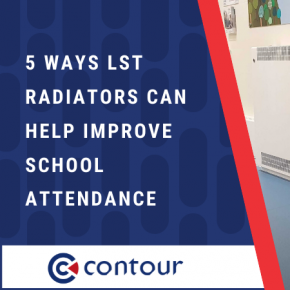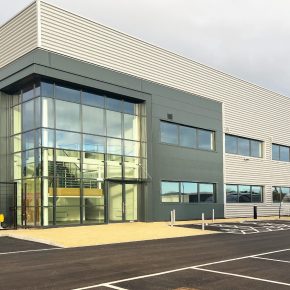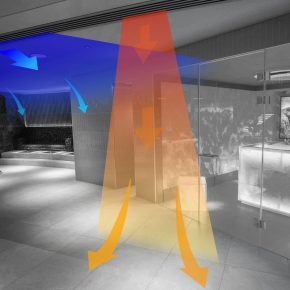
Five ways LST Radiators can help improve school attendance – Contour
Low surface temperature, or LST radiators, have long been considered a safe heating solution, especially in places that are either populated by heavy traffic, or in environments used by those most vulnerable, Contour explain…
LST radiators for schools have become one of the more popular environments – but not just for safety reasons, as they offer other benefits that assist in improving school attendance.
Below features a closer look at the three ways these appliances help lower absenteeism, which in England averages 7.2 days per year during a student’s primary years and 9.3 days annually during their secondary education years.
1. LST Radiators are Safer
As noted above, LST radiators are low temperature appliances, so any inadvertent contact in the classroom to an exposed radiator is not likely to result in injury.
This feature alone makes them a safer overall heating solution, especially compared to conventional radiators, which may operate at surface temperatures ranging from 60 to 80 degrees Celsius.
2. LSTs Are Easier to Clean
Another nice thing about LST radiators, especially in the classroom setting, is that they are easy to clean and maintain. Compared to conventional radiators, which take up to 30 minutes to clean after proper disassembly, LST radiators can be easily cleaned by one person in about give minutes.
This can help keep the classroom environment safer and healthier – and with minimal effort from cleaning and maintenance staff.
3. They Promote an Overall Healthier Environment
Many people joke that schools are like Petri dishes for germs – it’s estimated bacteria in primary schools is up to 15 times more prevalent than in the average indoor environment.
One of the items that collects the most bacteria in a classroom is the radiator, which often heats to ideal temperatures to harbour this bacterial growth.
LST radiators can help improve the indoor air quality in the classroom, as their surfaces work to better inhibit microbial growth to keep classrooms healthier.
4. LST Radiators May Have Anti-Microbial or Antibacterial Protection
Radiators that are surface treated with bacteria-inhibiting additives are proven to reduce bacteria by up to 95 percent in these environments, which can help keep children in school, and absenteeism to a minimum.
Many LST radiators now boast a form of protective coating, whether anti-bacterial or anti-microbial. For the specifier, it may be difficult to differentiate between the two.
While an antibacterial agent will kill a large range of mild bacteria, an antimicrobial agent offers a much broader scope of protection acting as an antibacterial, antibiotic, antifungal, antiparasitic and antiviral agent all-in-one!
This suggests that specifiers – or those responsible for the heating appliances within a school – should seek to choose a product that offers the greatest level of protection. In this case, an anti-microbial is far more superior than an anti-bacterial coating.
BioCote® is an anti-microbial. Contour’s DeepClean range of LST and anti-ligature radiators and guards all benefit from this superior protection. Learn more about BioCote’s unique properties by clicking here.
Studies have shown that BioCote®-protected classroom appliances have, in fact, reduced school absenteeism. During a recent study, two classrooms underwent a scientific analysis over the course of a year. One classroom contained BioCote-protected furniture and appliances, whilst the other classroom contained zero BioCote-protected items.
Alarmingly, the protected classroom reported an astonishing 20% reduction in pupil absenteeism over the course of the academic year. If you’d like to find out more on this case study, click here.
5. LST Radiators May Have Pencil Proof Grilles
When children are around, the design of furniture, fixtures and fittings should prevent injury and damage wherever possible. Quite often, radiator grilles are subjected to stationary and other classroom items being pushed inside the internal area of the radiator, causing damage over time.
Additionally, grilles to pose a risk of fingers or clothing being caught inside them.
When specifiers are looking for low surface temperature solutions, grill design should be closely considered. To read more about pencil-proof grilles, click here.
Contact Contour Heating Today
Given a child misses over 50 days on average during their primary education years and over 46 days during their secondary education years due to absenteeism, it is important to address issues preventing students from learning in the classroom environment.
Incorporating safer, healthier appliances in the classroom can help reduce pupil illness. For more info on LST radiators and how they can help reduce absenteeism rates, contact Contour Heating today.
Contour can be contacted at;
The Mansions
43 Broadway
Shifnal
TF11 8BB
Tel: 01952 290 498
Email: sales@contourheating.co.uk
Visit Supplier's page
Latest news

2nd April 2025
FIT Show 2025 Launches Innovative Marketplace Feature to Enhancing Value for Installers
FIT Show, the UK’s leading event for the window, door, flat glass, hardware, and roofing industries, is excited to announce the launch of a brand new Marketplace feature at its upcoming 2025 event (Birmingham NEC, 29 April – 1 May).
Posted in Architectural Ironmongery, Articles, Building Industry Events, Building Industry News, Building Products & Structures, Doors, Exhibitions and Conferences, Glass, Glazing, Hand Tools, Innovations & New Products, Plant, Equipment and Hire, Power Tools, Restoration & Refurbishment, Retrofit & Renovation, Roofs, Seminars, Training, Windows
2nd April 2025
Hi-spec deployment of EJOT Colorfast at new Birmingham logistics park
EJOT Colorfast fasteners have been used extensively in the construction of eight new high-specification warehousing and logistics buildings at the Urban 8 Logistics Park in King’s Norton, Birmingham.
Posted in Articles, Building Industry News, Building Products & Structures, Building Systems, Case Studies, Facades, Restoration & Refurbishment, Retrofit & Renovation, Roofs, Walls
2nd April 2025
SWA member delivers ‘fresh Hope’ for university’s Sustainable Building department
A detailed contract to restore an iconic Art Deco building in the heart of Birmingham’s Jewellery Quarter was carried out by Steel Window Association member, The Window Repair Company (Northwest) Limited.
Posted in Articles, Building Associations & Institutes, Building Industry News, Building Products & Structures, Building Systems, Case Studies, Glass, Glazing, Restoration & Refurbishment, Retrofit & Renovation, Steel and Structural Frames, Sustainability & Energy Efficiency, Windows
1st April 2025
Gilberts Takes Thermal Comfort to New Heights
Gilberts Blackpool is continuing to build on its reputation as a pioneer with the unveiling of ThermaAstute™ – the most extensive range of thermally sensitive diffusers in the market.
Posted in Air Conditioning, Articles, Building Industry News, Building Products & Structures, Building Services, Facility Management & Building Services, Heating, Ventilation and Air Conditioning - HVAC, Innovations & New Products, Restoration & Refurbishment, Retrofit & Renovation, Sustainability & Energy Efficiency
 Sign up:
Sign up: